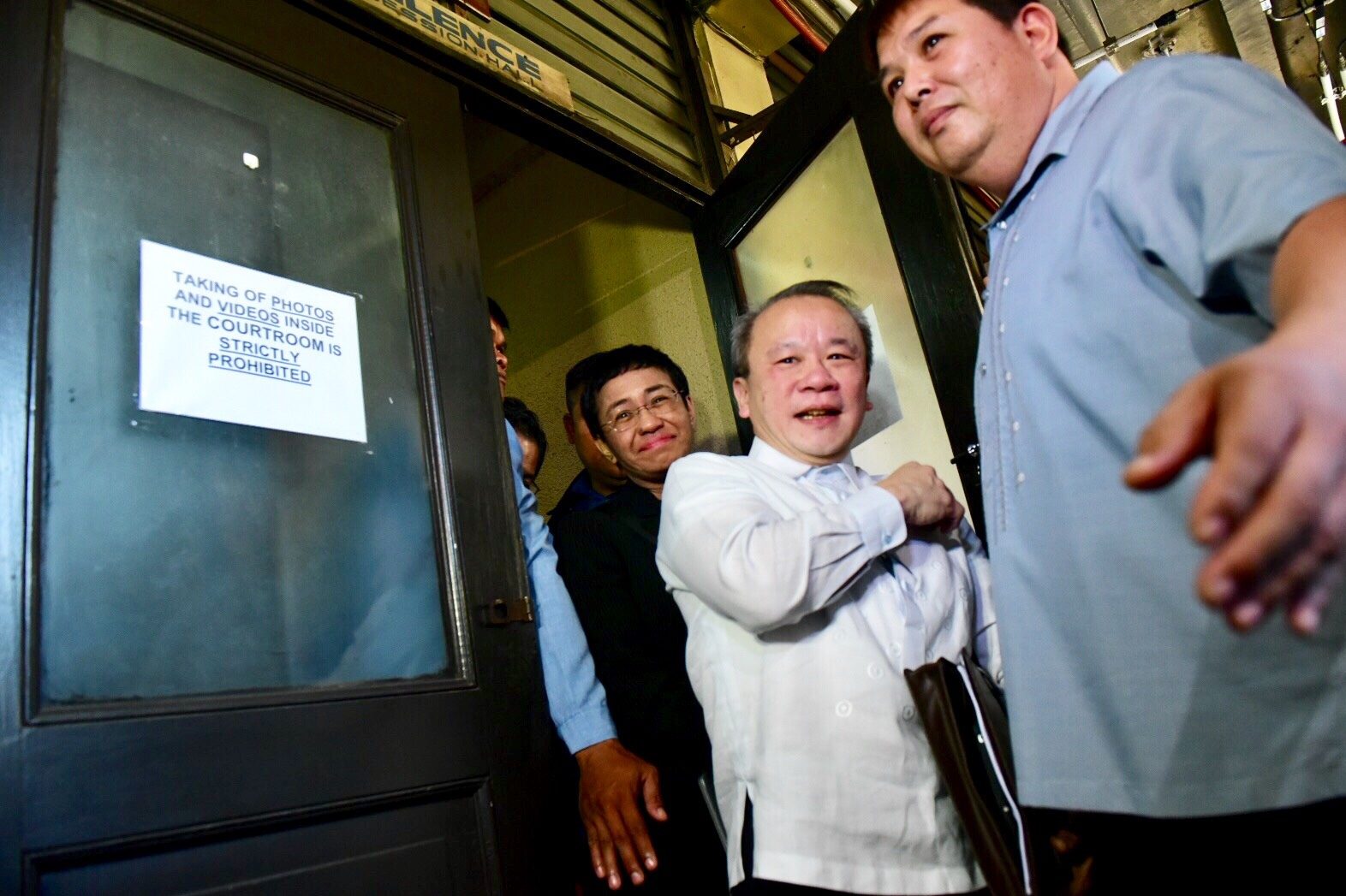SUMMARY
This is AI generated summarization, which may have errors. For context, always refer to the full article.

MANILA, Philippines (UPDATED) – Five years after the Supreme Court decided that cyber libel is constitutional, the charges against Rappler and its CEO Maria Ressa are bringing up issues that, according to human rights lawyer Ted Te, may prompt a revisit of the once hotly-contested law.
Te and the Free Legal Assistance Group (FLAG) have taken on the cyber libel case against Rappler, Ressa, and the writer of the disputed article, former researcher Rey Santos Jr.
“If the opportunity presents itself, then it’s possible that we will ask [the Supreme Court] to revisit the law itself, this time pertaining to cyber libel because that is the charge against Maria and Rey,” Te told reporters on Friday, March 1, at the Manila Regional Trial Court (RTC).
Ressa and Santos were supposed to be arraigned on Friday before the Manila RTC Branch 46, but the schedule was reset to give time to the Department of Justice (DOJ) to respond to the Motion to Quash prepared by FLAG for Rappler.
“We have to wait for the RTC to rule. If the RTC rules against us, then it might be appropriate for us to ask the [Supreme] Court to revisit the Cybercrime Act of 2012, particularly as pertaining to cyber libel,” said Te.
Contested law
A total of 15 petitions were filed against the Cybercrime Act of 2012. The Supreme Court issued a temporary restraining order (TRO) and stopped the implementation of the law in October 2012 while it tackled the petitions in oral arguments.
On February 11, 2014, the Supreme Court issued the decision that clarified parts of the law, including declaring cyber libel as constitutional.
Te said in the motion to quash on Friday that motions for reconsiderations were filed after February 11, 2014. These were resolved with finality only on April 22, 2014.
While the Rappler article was published in 2012, months before the cybercrime act enacted, and a complaint was filed only 5 years later, the DOJ still charged Rappler for cyber libel because it considered the typographical edits made on February 19, 2014, as “continuous publication.” Te argued that on that date the TRO was still in effect, so there was no law to apply this “republication rule.”
“It’s ridiculous that Rappler and I have had to face at least 10 cases in the span of about a year, that I have had to post bail at least 6 timesl, and to be arrested and detained based on a cyber libel law that a) did not exist and b) even if you go by what the charge sheet says, there was a TRO, there was no law,” said Ressa.
Aside from that argument, Te pointed out that the Supreme Court had declared that cyber libel “is not a new crime” from the libel defined in the Revised Penal Code (RPC).
Under the RPC, libel extinguishes in one year, meaning a complainant has to pursue the case within one year of publication. The DOJ has interpreted the cybercrime law as extending the prescription period for libel from a mere one year to 12 years.
“Many of those issues are coming back, so its like deja vu, but this time the difference is there are now persons that are charged. If you read the two decisions of the Court in the Cybercrime Act challenge of 2012, many of the fears that are expressed there are actually coming out in this particular case in relation to cyber libel,” said Te.
Ressa and Santos were present in the court on Friday. Complainant and businessman Wilfredo Keng was represented only by lawyers. (READ: Maria Ressa arrest tests the bounds of Philippine cyber libel law)
“Instead of saying that this is a chilling effect, it’s actually a wake-up call for all media outlets to be judicious and responsible in their reporting,” said Keng’s lawyer Ryan Cruz.
Another one of Keng’s lawyers, Joseph Banguis, said they are confident that Judge Rainelda Estacio Montesa will deny Rappler’s motion to quash.
“We feel there are no grounds to the motion to quash. It should be denied and we should proceed to trial. If they feel that there’s nothing wrong with the article, they should not be afraid to face trial,” said Banguis.
‘Weaponization of law’
In a statement, the Philippine Bar Association said Ressa’s cyber libel case is now sub judice and off limits to discussion of its merits.
“Law students and legal professionals alike look forward to how the courts will resolve threshold issues such as the purported retroactive application of the Cybercrime Prevention Act, possible prescription of the crime of libel and the theory of continuous publication of online statements and articles,” the group said.
The Philippine Bar Association also said it “views with serious concern how the law is being weaponized to silence critics and perceived enemies of the administration, rather than employing it as a means to realize the true majesty of the rule of law.”
The group urged Ressa, her colleagues, and Filipinos to remain optimistic “in our collective power to overcome.” – Rappler.com
Add a comment
How does this make you feel?
There are no comments yet. Add your comment to start the conversation.